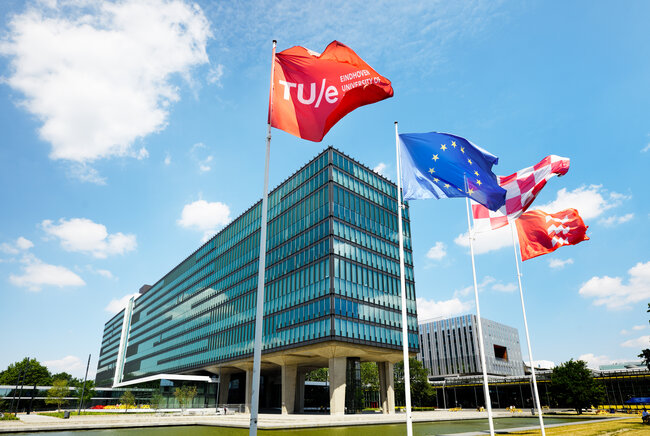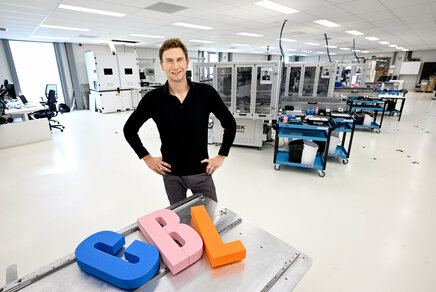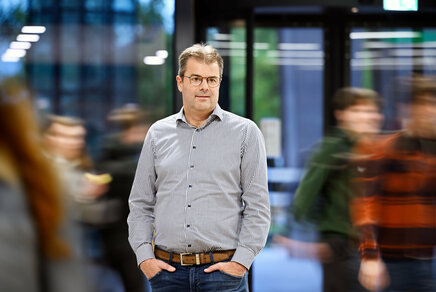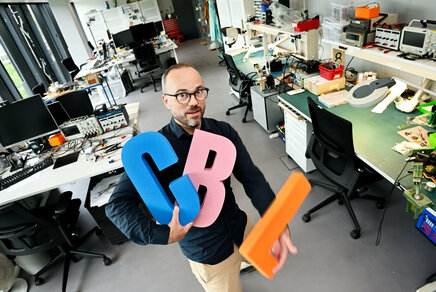Update on TU/e’s Scale Jump: proposal soon heading for The Hague
At the core is a doubling of the number of master's degree graduates by 2032 to meet the rapidly growing need of the Brainport region for engineers.

Today there were two information sessions in the Auditorium in which the Executive Board provided an update on the development of the ideas for the accelerated growth of TU/e. At the core is a doubling of the number of master's degree graduates by 2032 to meet the rapidly growing need of the Brainport region for engineers. The ideas, based on advice from the Think Tank led by Maarten Steinbuch, will be incorporated into a proposal from Brainport that is expected to be submitted to The Hague in early 2023.
Background
Brainport is fast becoming the number 1 economic engine of the Netherlands. To enable this growth, the government has drawn up a strategic growth agenda together with the Brainport region. A key component of this, whereby TU/e plays a leading role, is to double the number of students and graduates in the region. As the historic purveyor of engineers to Brainport, TU/e is keen to grow with the region and has developed ideas to do so. These ideas also respond to the ever-increasing demand for highly educated engineers to solve societal challenges and to strengthen Europe's strategic autonomy.
Content of the plan
The basis of the plan is to double the number of master's degree graduates by 2032, which will increase the total student population from about 13,000 now to 21,000 in 2035. This strong growth will not really begin until after 2025, enabling the university to first arrange the necessary framework conditions. Investment will first have to be made in additional buildings for teaching and research, and additional staff will have to be hired.
The strongest increase is anticipated in master's programs in the fields of greatest need, including electrical engineering, computer science and mechanical engineering. In master's programs in other fields, the numbers will also increase substantially. Furthermore, the intention is to start a number of new master's programs that respond to new needs, for example in the areas of circularity, health engineering and high-tech systems.
There will also be significant focus on maximizing the stay rate: ensuring that as many students as possible choose a master's degree in Eindhoven after their bachelor's and then go to work in this region. One of the focal points is therefore further improving the intake of Dutch students, because Dutch students generally have the highest stay rate. In addition, growth will certainly also happen in the influx of internationals from the EEA.
The envisioned growth in student numbers also means that substantial growth is needed in the workforce, which will rise from about 3,600 FTE now to 6,400 FTE in 2035. The number of staff per student will increase, both academic and support, partly because the focus will be on master's programs, in which students will receive more guidance. This will lead to an improvement in the student-staff ratio. All in all the growth will enable the university to grow in quality, excellence and relevance.
Executive Board
Executive Board President Robert-Jan Smits: “We are very positive about the very well thought-out and qualified advice that the Think Tank produced. We are grateful to all involved for their efforts in this regard. Through these ideas we clearly show our willingness to take our responsibility, in cooperation with the region. We are now going to look together with Brainport and The Hague at fulfilling the preconditions.”
The four conditions for growth
The university is prepared to grow along with the Brainport region, subject to four conditions:
-
Up-front government funding to facilitate growth and to prevent the current workload from increasing further.
-
Growth should not come at the expense of excellence.
-
Growth should be gradual to keep the workload manageable.
-
The region must ensure that the infrastructure and facilities are in order.
Process of creation
The Think Tank, led by Maarten Steinbuch, prepared its advice at the request of the Executive Board, and to this end held sessions from August through October. These included consultations with deans, directors and students, the University Council, the Eindhoven Young Academy, and external parties such as Eindhoven Fabrikantenkring, Fontys Hogescholen and Summa College.
During the recent TU/e Strategy Days the Think Tank's advice was discussed with deans and directors, among others. Today there are two information sessions where the Executive Board explains its ideas to the TU/e community. You can view the presentation of the sessions here. Subsequent steps include information sessions per department.
Way forward
The advice of the Think Tank is the basis for a 'business case', which has been prepared and will be included in a Brainport-wide proposal to The Hague in the field of Talent. This proposal is a broad 'Brainport talent proposition' which will be made in collaboration with Fontys Hogescholen, Summa College and Brainport, among others. This is expected to be submitted to The Hague through the special Brainport ministerial consultation in early 2023. In the course of next year, more will become known about how The Hague intends to improve the availability of talent in Brainport.
Media contact
More on our strategy


